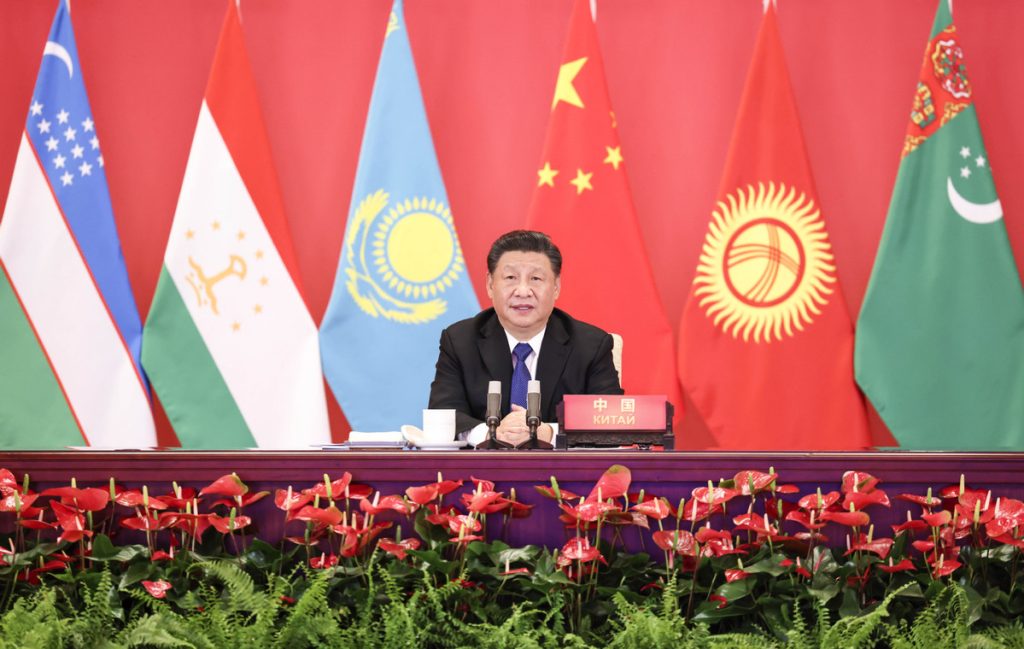Xi Jinping keynote address at China-Central Asia Summit highlights

Xi’an, The Gulf Observer: Chinese President Xi Jinping on Friday delivered a keynote address at the China-Central Asia Summit held in the city of Xi’an, northwest China’s Shaanxi Province.
The summit, which runs from Thursday to Friday, was attended by Kazakh President Kassym-Jomart Tokayev, Kyrgyz President Sadyr Japarov, Tajik President Emomali Rahmon, Turkmen President Serdar Berdimuhamedov and Uzbek President Shavkat Mirziyoyev.
China and Central Asian countries have joined hands over the past decade to usher in a new era of their relations, Xi noted.
‘Stable, prosperous, harmonious and well-connected’ Central Asia
The sovereignty, security, independence and territorial integrity of Central Asian countries must be safeguarded, the development paths independently chosen by Central Asian people must be respected, Xi said, adding that the efforts made by the region to pursue peace, amity and tranquility must be supported.
The Chinese president said a prosperous Central Asia will meet the aspiration of people of different countries in the region for a better life, and inject strong impetus into world economic recovery.
He said ethnic conflicts, religious disputes and cultural division are not the main theme in Central Asia, while solidarity, inclusiveness and amity are the pursuit of the Central Asian people.
The region, blessed with unique geographical advantages, has the foundation, conditions and capabilities to become an important hub for the connectivity of the Eurasian continent, and to make Central Asian contributions to the exchanges of goods, the interactions between civilizations and the development of science and technology in the world, he said.
A China-Central Asia community with a shared future
China and Central Asian countries should deepen strategic mutual trust, and always offer clear and strong support for each other on issues of core interests such as those involving sovereignty, independence, national dignity and long-term development, Xi noted.
Underscoring common development, the Chinese president called on the six countries to continue taking the lead in Belt and Road cooperation and to promote the implementation of the Global Development Initiative.
He also called for efforts to fully unleash cooperation potential in traditional areas such as trade, industrial capacity, energy and transportation, and to foster new growth drivers in areas such as finance, agriculture, poverty reduction, low carbon, health and digital innovation.
Stressing the need to uphold universal security, Xi said the six countries should jointly implement the Global Security Initiative.
The six countries should resolutely oppose external interference in the internal affairs of regional countries and attempts to instigate “color revolutions,” and maintain a zero-tolerance stance against the “three forces” of terrorism, separatism and extremism, Xi said.
Underscoring the need to uphold everlasting friendship, he said the six countries should implement the Global Civilization Initiative.
They should carry forward their traditional friendship, promote personnel exchanges, strengthen exchanges of governance experience, enhance mutual learning among civilizations, and advance mutual understanding, he added.
Cooperation in the new era
Xi set out an eight-point proposal ranging from expanding economic ties to strengthening cultural exchanges and safeguarding regional peace.
China is ready to take the summit as an opportunity and work closely with Central Asian countries to ensure China-Central Asia cooperation is well planned, effectively implemented and steadily advanced, Xi said.
To strengthen cooperation mechanisms, China proposes establishing meeting and dialogue mechanisms in industry and investment, agriculture, transportation, emergency management, education and political party affairs, Xi said.
To enhance connectivity, China will boost cross-border freight volume, support the construction of a cross-Caspian Sea international transport corridor, accelerate the upgrade of ports, develop China-Europe freight train hubs and encourage businesses to build overseas warehouses in Central Asian countries, Xi said.
In terms of energy cooperation, China proposes building a China-Central Asia energy development partnership, accelerating the construction of Line D of the China-Central Asia natural gas pipeline, increasing oil and gas trade, developing energy cooperation across the industrial chain, and boosting cooperation in new energy and the peaceful use of nuclear energy.
China is ready to promote green innovation cooperation with Central Asian countries, Xi said, citing soil treatment, water-efficient irrigation, and the establishment of high-tech businesses and information technology parks in Central Asia.
To bolster development capacity, China will formulate plans for cooperation with Central Asian countries in reducing poverty through science and technology, Xi said. Chinese-funded businesses will be encouraged to create more local jobs. China will provide 26 billion yuan (about $3.72 billion) of financing support and free assistance to Central Asian countries.
With regard to cultural exchanges, China will invite Central Asian countries to participate in the Cultural Silk Road program, build more traditional medicine centers, and promote the launch of special trains for cultural tourism, Xi said.
Xi stressed that China is ready to help Central Asian countries improve their law enforcement, security, and defense capacity building in an effort to safeguard regional peace. Efforts should also be made to make good use of the mechanism of coordination among Afghanistan’s neighbors and jointly promote peace and reconstruction in Afghanistan.
China is willing to strengthen exchanges with Central Asian countries in modernization concepts and practice, synergize development strategies and make joint efforts to promote modernization of the six countries, Xi said.